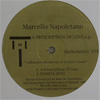The catalog of Mathematics Recordings could be reductively portrayed as doggedly flying the colors for a very particular template of analog house sounds while, ideally, asserting new and distinctive individual artistic visions. A mix of seminal pioneers still plugging away and fresh faces mining similar territory, this Jamal Moss-operated label has always, at the very least, been one worth keeping tabs on. New recruit Marcello Napoletano’s background includes some left-field jazz piano, but his new record’s title hints at a far more apparent antecedent: vintage Chicago house from the likes of Ron Trent et al. However, Napoletano’s sound has a raw, unprocessed quality that owes as much to the likes of Adonis or Steve Poindexter (two of the aforementioned pioneers on the Mathematics roster).
Napoletano’s most straightforward and streamlined synthesis of these influences is the gristly title track. Here, his restless bass lines course through metallic percussion that pierces like broken glass and abrupt synth stabs that genuinely startle. “Planeto Juno” meanwhile, unleashes a crunchy, jacking beat over disoriented, slurring keyboards. Its energy is both overheated and lopsided, but ultimately persuasive. Napoletano’s jazz instincts step forward on the unabashedly strange “Jazz del Sottopassaggio”; the drums holding a more regular cadence while downtrodden organ chords and keyboard flutters lend the track — odd as this may sound — a freewheeling bluesiness. “Linguetta Acida” (featured as a Jamal Moss edit) is, no surprise, a twisting piece of caustic acid with mock-exotic flourishes and spacey drones. All these tracks (with the possible exception of the title track) have a casual, one-take air that complements the analog palette nicely. The entranced melodies of “Amici” however, finally skid into a jam session turned listless. By the track’s end, even the percussion seems to trail off. Moving past loose to untidy, Napoletano gets perhaps a little too comfy on this closing track. Oh well. He’s been walking a fine line between offhand and direct and, for the bulk of the record, it’s paid off very well.















